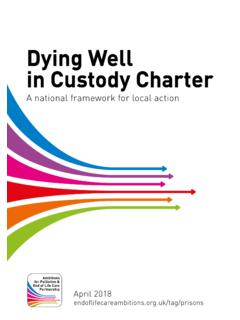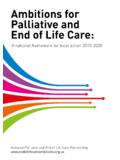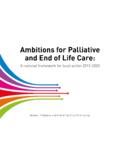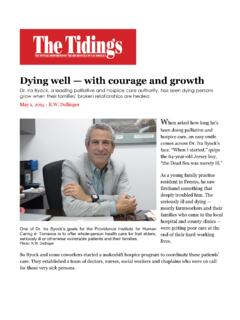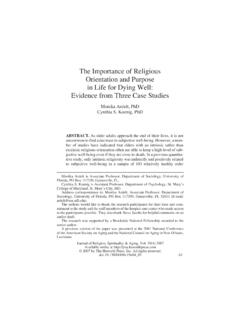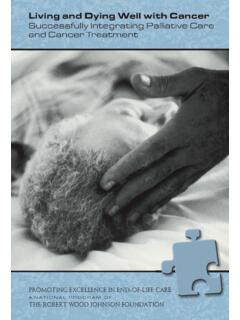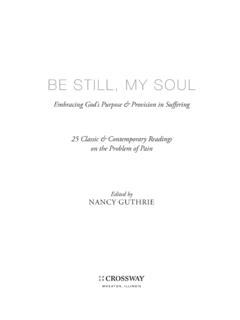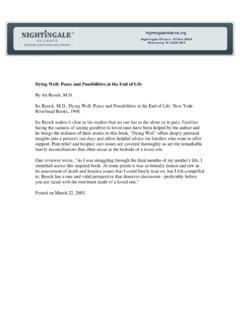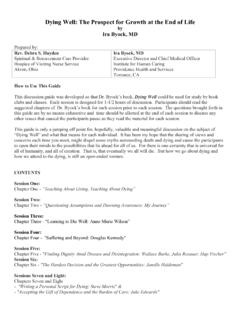Transcription of Dying Well in Custody Charter - endoflifecareambitions.org.uk
1 Dying well in Custody Charter Self-Assessment ToolApril 2018 national framework for local actionAmbitions for Palliative &End of Life CarePartnershipContents 3 Foreword 4 Introduction 5 Implementation Guide 8 Ambition 1: Each person is seen as an individual 12 Ambition 2: Each person gets fair access to care 13 Ambition 3: Maximising comfort and wellbeing 16 Ambition 4: Care is coordinated 19 Ambition 5: All staff are prepared to care 22 Ambition 6: Each community is prepared to help 24 Examples of Evidence 25 Glossary of Terms 28 Useful Links and References 30 Acknowledgements 2 Foreword Dying well wherever you are and whatever your background or circumstances are fundamental aspects of human dignity.
2 As part of a compassionate humane society, we need to do everything we can to make sure that people who are facing their last months, weeks and days of life receive the best possible palliative and end of life care. Those who care for them, including their families, others important to them and staff around them, equally deserve this consideration and support. As co-chairs of the Ambitions Partnership, we are delighted that the Ambitions for Palliative and End of Life Care Framework has been applied to the context of the prison setting and interpreted as a Charter . To our knowledge, this is the first time anywhere in the world that the principle of equity has been applied in such a practical way.
3 This is truly a remarkable first. The articulation of a set of standards, which are a set of guidelines setting out best practice, underpin each of the six ambitions and the development of a self-assessment tool to use alongside it has the potential to make a huge difference. Our shared vision is: I can make the last stage of my life as good as possible because everyone works together confidently, honestly and consistently to help me and the people who are important to me, including my carers . No matter where any prison is on the trajectory towards that vision, they will be able to use this Charter and self-assessment tool to help them continuously improve.
4 We recognise that the custodial environment is different to other settings in which clinical care takes place, and that providing the best possible end of life care in prison is complex and challenging. It is precisely because of that that we welcome this publication so enthusiastically. We would strongly encourage commissioners, leaders, staff and supporters of prison services to read this and, more importantly, use it to help them in their endeavours to improve the way in which each person can live and die well in Custody . Prof Bee Wee Dr Jane Collins National Clinical Director of End of Life Care Chief Executive Officer NHS England Marie Curie, UK Co-Chairs of the Ambitions for Palliative and End of Life Care Partnership 2 Foreword Dying well wherever you are and whatever your background or circumstances are fundamental aspects of human dignity.
5 As part of a compassionate humane society, we need to do everything we can to make sure that people who are facing their last months, weeks and days of life receive the best possible palliative and end of life care. Those who care for them, including their families, others important to them and staff around them, equally deserve this consideration and support. As co-chairs of the Ambitions Partnership, we are delighted that the Ambitions for Palliative and End of Life Care Framework has been applied to the context of the prison setting and interpreted as a Charter . To our knowledge, this is the first time anywhere in the world that the principle of equity has been applied in such a practical way.
6 This is truly a remarkable first. The articulation of a set of standards, which are a set of guidelines setting out best practice, underpin each of the six ambitions and the development of a self-assessment tool to use alongside it has the potential to make a huge difference. Our shared vision is: I can make the last stage of my life as good as possible because everyone works together confidently, honestly and consistently to help me and the people who are important to me, including my carers . No matter where any prison is on the trajectory towards that vision, they will be able to use this Charter and self-assessment tool to help them continuously improve.
7 We recognise that the custodial environment is different to other settings in which clinical care takes place, and that providing the best possible end of life care in prison is complex and challenging. It is precisely because of that that we welcome this publication so enthusiastically. We would strongly encourage commissioners, leaders, staff and supporters of prison services to read this and, more importantly, use it to help them in their endeavours to improve the way in which each person can live and die well in Custody . Prof Bee Wee Dr Jane Collins National Clinical Director of End of Life Care Chief Executive Officer NHS England Marie Curie, UK Co-Chairs of the Ambitions for Palliative and End of Life Care Partnership Foreword34 3 Introduction It remains a contentious position that anyone should experience a planned death in prison.
8 However, for some individuals compassionate release to alternative premises in which they can end their life is either not possible or unwanted and therefore there is a requirement that those individuals who do have a planned death in a custodial setting experience the highest standards of care. In the community close friends and family are key and central to the individuals care yet in the prison environment are often forgotten or their role misunderstood when planning end of life care. Also, the support for close ones is key to the holistic care of the individual. Many of the people in prison who are coming to the end of their life have been in prison for a number of years and are surrounded by staff and fellow prisoners with whom they are comfortable.
9 The staff may well have been a consistent presence in their lives during their period of Custody and their peers are their friends and support. It is for these reasons that I truly welcome this Dying well in Custody Charter . The Charter mirrors the Ambitions for Palliative and End of Life Care and provides a framework for establishments to act, help and support all staff who are involved in the care of an individual preparing to die, many of whom will not have experienced supporting an individual in their planned death. This framework provides a set of standards sitting underneath 6 statements of Ambition which place the individual at the centre of the care being planned and delivered.
10 The Ambitions and Standards in the Dying well in Custody Charter ensure that care is co-ordinated across the establishment and supports all staff being able to achieve a level of competence and confidence in delivering professional care to these individuals with dignity and calm. End of life care is enormously important for the individual being cared for as it is for their friends, families and carers. It is the last thing that can be done for a living person and it is critical that it is done well . This Dying well in Custody Charter enables those involved in caring for individuals to manage this event with compassion, inclusivity and ensures that there is dignity in the death irrespective of their place of death.
